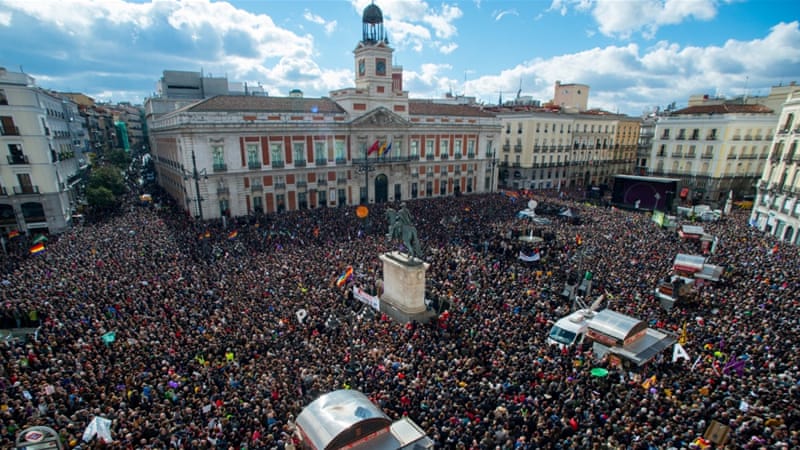
How Bernie Sanders, In New Role, Could Make Wall Streeters Very, Very Unhappy
By Ari Rabin-Havt
Progressive America Rising via American Prospect
Jan 26, 2015 – Big banks now have to contend with an old enemy in a new position of power.
Bernie Sanders, the United States senator from Vermont, plans on using his new position as ranking member of the Senate Budget Committee to take on too-big-to-fail financial institutions by advocating for their dissolution. Though a registered independent, Sanders caucuses with the Democrats, allowing him to assume the ranking member role representing the minority party.
Sanders knows how to draw the media spotlight when advocating for a cause.
While normally the domain of the Senate Banking Committee, the oversight of Wall Street, Sanders and his staff believe, is a critical budgetary issue. Democrats need to directly challenge Wall Street’s power, they assert, by boldly reframing the argument against the consolidation of financial institutions in terms of its cost to the national coffers. Though the term “ranking member” might not ordinarily have the barons of finance quaking in their custom-made oxfords, Sanders knows how to draw the media spotlight when advocating for a cause.
“Being the ranking member of the budget committee gives Senator Sanders the opportunity to say, look, people on food stamps didn’t cause the economic crisis, people that lost their jobs weren’t responsible for the economic crisis that we faced,” explained Warren Gunnels, director of the committee’s minority staff, during an interview in his office. “Average ordinary Americans weren’t responsible for the financial crisis we had.”
While centrist Democrats have expressed displeasure with progressives’ forceful defense of regulations included in the Dodd-Frank Wall Street Reform and Consumer Protection Act of 2010. Sanders plans on pushing the boundaries of the debate in the other direction. This potentially puts Sanders, who is seriously considering a run for the White House, in a head-on conflict with Hillary Clinton, Wall Street’s favorite presidential candidate.
As media types muse over Sanders’s prospective presidential campaign, the focus of the minority Budget Committee staff, hard at work in a corner suite on the sixth floor of the Dirksen Senate office building, is elsewhere. Such a run by the senator would no doubt shine a light on the mission he’s set before his committee staff, but the work in this office has no connection to that effort.
Packed boxes are stacked almost randomly as the staff focuses on more important matters—unpacking would be just a temporary process, anyway. Republicans, having won the Senate in the midterms, will take over the office in a few months after the rush of budget season subsides.
Warren Gunnels’s office has a sweeping view of the Capitol dome, but for most of the hour I spent speaking with him about Sanders’s plans for the upcoming Congress, the blinds remain closed.
Gunnels has worked for Sanders in a variety of capacities since 1999, journeying with the Vermonter from his House staff to his Senate staff, when Sanders won the office in 2006, and now to the Budget Committee. There Sanders has recruited a hard-charging group that is by far the most progressive of any committee on Capitol Hill. Instead of sulking in the Democrats’ new minority status, Sanders is preparing to use his staff to advocate aggressively on behalf of a progressive agenda.
Even late on a Friday afternoon, with the senator back in Vermont, there is a sense of hustle in the office, with several meetings taking place around desks.
Gunnels put the blame for our economic collapse squarely on Wall Street. “The people responsible for the financial crisis were the CEOs in charge of the largest financial institutions in this country,” he said. “That nearly drove the economy off a cliff. We are still paying for that today.” (Continued)
Continue reading Uphill Fight: Taking on Finance Capital in Congress



